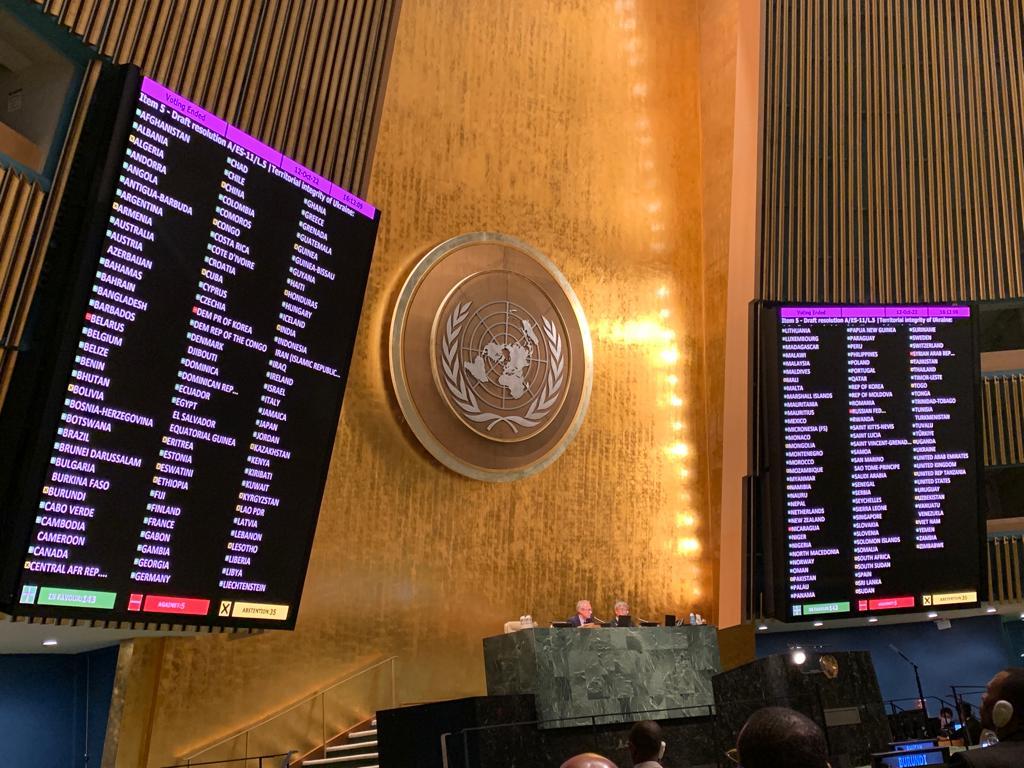Behind the scenes: Defending the UN Charter

After Russia’s veto on 30 September in the UN Security Council of a resolution tabled by the US and Albania to condemn Russia’s attempted land grab in four regions of Ukraine, all eyes were on the EU to take up the baton in the United Nations General Assembly – the centre of multilateral diplomacy, where all UN Member States have a vote and Russia has no veto.
Laying the groundwork
Moscow’s decision to further escalate its aggression against Ukraine with sham referenda and attempted annexations demanded a strong international response. After Russia’s veto in the Security Council the EU Delegation in New York immediately met with colleagues at the Ukrainian mission to discuss how to advance a resolution to this effect in the General Assembly. To ensure broad support, it was agreed that the text should focus on the illegality of Russia’s assault on Ukraine’s territorial integrity and sovereignty and that the consultation process would be as inclusive and transparent as possible, allowing all UN members to weigh in.
Working closely with Ukraine, EU Member States in New York and close partners, the EU Delegation reached out to the wider UN membership. Two cross-regional consultations allowed for fine-tuning the text to meet the expectations of partners around the world. The negotiators exchanged hundreds of messages and had many phone calls with colleagues from all world regions. These consultations – in which more than 120 countries participated – helped improve the text by including consensual language that would enable more countries to support it.
In parallel with negotiations in New York, the EU mobilised its entire diplomatic network to muster as much global support for the resolution as possible. The EEAS in Brussels sent a global instruction to all EU Delegations worldwide to reach out to political decision-makers in third countries and engage with them on the text. Ambassadors and political leaders called ministers and heads of state and government in over 100 countries around the world to convince them of the merits of this EU initiative. At the same time in New York the EU Delegation coordinated outreach efforts with EU member states and close partners. The strong positive response we received demonstrated the international community’s determination in upholding the UN Charter.
A historic vote
The vote itself was suspenseful, following two tense days of the General Debate of the 12th Emergency Special Session on Ukraine. The first day was marked by Russian procedural manoeuvres: Russia asked for the vote on the resolution to take place by secret ballot (unprecedented in the GA’s 77-year history) and criticized the President of the General Assembly for not supporting this request. The EU and its partners came prepared and had planned for the different scenarios. UN Member States rejected this procedural distraction aimed to undermine the transparency of the GA. After Russia lost three procedural votes by a wide margin, the debate on the resolution started. Eighty UN member states and observers took the opportunity to comment on the draft resolution text. Some of the most compelling speeches against Russia’s attempted annexations were delivered by small countries far from Europe, mindful that the principles of the UN Charter protect not just Ukraine but all sovereign states.
In the moments before the vote the General Assembly was silent with anticipation. And when the result appeared on the enormous screens at the front of the hall, many diplomats erupted in applause. With 143 positive votes the text received even more support than the first GA resolution condemning Russia’s aggression early March. More importantly, only five countries voted against, underlining Russia’s continued isolation on the world stage.
“It was truly something special to be in the middle of such a global effort, particularly when the result is such a resounding condemnation of an attempted illegal annexation of a part of Europe,” noted Ewout Stoefs, counsellor at the EU Delegation.
While this resolution may not immediately alleviate the situation of those suffering under Russian shelling, it is a clear sign to decision-makers in Moscow – and anyone tempted to follow their example – on where the international community stands with regards to Ukraine’s sovereignty.
"This is a resounding message that speaks to the world. Russia has tried to silence the Security Council, but it has been unable to silence the General Assembly of the United Nations," EU Ambassador Olof Skoog told the press following the vote.
The EU consulted widely with the UN membership. We are grateful to all UN Member States that joined us today in defending the UN Charter.
The international community is clear: Luhansk, Donetsk, Kherson and Zaporizhzhia, like Crimea, are Ukraine. pic.twitter.com/bWwBWts31h
— ??EU at UN-NY (@EUatUN) October 12, 2022




